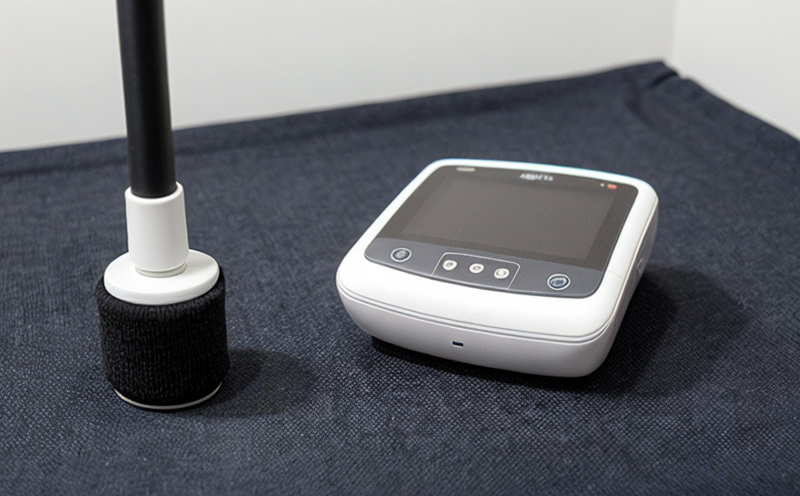IEC 60068-2 Environmental testing of wearable electronic textiles
The IEC 60068-2 series of standards provides comprehensive guidance for the environmental testing of electrical and electronic products. One specific subset, IEC 60068-2, focuses on various non-climate stresses that can affect the performance of these devices under different environmental conditions.
Within this context, we specialize in providing IEC 60068-2 environmental testing services specifically tailored to wearable electronic textiles. This service is crucial for ensuring the reliability and durability of smart and functional textiles designed for various applications such as healthcare monitoring, fitness tracking, and augmented reality.
The process involves subjecting samples of these textiles to a series of tests that simulate real-world conditions they might encounter during use or storage. These include mechanical stress (such as vibration), thermal cycling, humidity, and altitude exposure. The aim is to ensure that the embedded electronics within these textiles remain functional even after prolonged exposure to these environmental factors.
Our testing facility uses state-of-the-art equipment capable of replicating a wide range of conditions. For instance, our climate chambers can simulate temperatures from -40°C to 150°C and humidity levels up to 98% RH. Additionally, we have facilities for vibration tests which are essential in assessing the robustness of textile structures embedded with sensors or other electronic components.
The testing process begins with careful preparation of the samples. This includes cleaning them thoroughly before placing them into appropriate fixtures inside our environmental chambers. Once set up, each sample undergoes multiple cycles of stress to mimic expected usage scenarios. After completion, we conduct thorough inspections and measurements using advanced diagnostic tools to determine whether there has been any degradation in performance.
It is important to note that IEC 60068-2 standards are not just about ensuring physical durability but also maintaining accuracy of embedded sensors and functionality of connected devices. For instance, if a wearable textile is being used for heart rate monitoring, we would check post-test whether the readings from the sensor remain accurate.
Our team of experts ensures that all tests comply strictly with IEC 60068-2 specifications while providing detailed reports highlighting both pass/fail outcomes along with any notable observations during testing. These insights are invaluable for manufacturers who seek continuous improvement in their product designs and materials selection processes.
| Standard Number | Title |
|---|---|
| IEC 60068-2-1 | Test Methods for Determination of Electrical Characteristics under Non-climate Stress Conditions - Part 1: General Requirements |
| IEC 60068-2-37 | Vibration, Shock and Mechanical Impact - Testing to Vibration - Frequency Range from 5 Hz to 800 Hz |
Applied Standards
The IEC 60068-2 series of standards is widely recognized as the benchmark for environmental testing in electrical and electronic products. Here are some key standards relevant to our service:
| Standard Number | Title |
|---|---|
| IEC 60068-2-13 | Vibration, Shock and Mechanical Impact - Testing to Vibration - Frequency Range from 5 Hz to 800 Hz |
| IEC 60068-2-14 | Vibration, Shock and Mechanical Impact - Testing to Vibration - Frequency Range from 5 Hz to 1500 Hz |
These standards cover various types of environmental stresses that can affect the performance of electronic textiles. By adhering strictly to these guidelines, we ensure that our testing results are accurate and reliable.
Quality and Reliability Assurance
- We employ only certified technicians trained specifically in IEC 60068-2 standards.
- All samples undergo rigorous pre-test checks to ensure consistency across tests.
- Our climate chambers are regularly calibrated against international norms to maintain precision.
The quality of our testing is further enhanced by employing advanced diagnostic tools capable of detecting even subtle changes in sensor performance or material integrity. This comprehensive approach ensures that every aspect of the textile's design and manufacturing process meets stringent requirements set forth by IEC 60068-2.
Customer Impact and Satisfaction
The results from our IEC 60068-2 environmental testing services have a significant impact on customers, especially those involved in the development of smart and functional textiles. Here's how:
- By identifying potential issues early on, manufacturers can make necessary adjustments to their designs before mass production begins.
- The detailed reports provided after each test cycle help quality managers track improvements over time.
- Compliance officers benefit from having clear evidence that their products meet international standards, thereby reducing risks associated with non-conformance.
In summary, our IEC 60068-2 environmental testing services play a crucial role in ensuring the reliability and durability of wearable electronic textiles. They contribute directly to enhancing customer satisfaction by delivering high-quality products that perform consistently across diverse environments.





